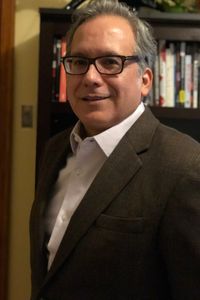Michael Dueñes
Elections and appointments
Personal
Contact
Michael Dueñes ran for election for an at-large seat of the Minneapolis Board of Education in Minnesota. He lost in the general election on November 3, 2020.
Dueñes completed Ballotpedia's Candidate Connection survey in 2020. Click here to read the survey answers.
Biography
Dueñes was born in Waseca, Minnesota. He earned his bachelor's degree from Macalester College in 1991 and his Ph.D. from the University of Michigan in 2013. Dueñes' professional experience includes working as a senior policy analyst. He has also worked as a dean of liberal arts, a professor of political science, and as a professor of ethnic studies and Chicano/Latinx studies. Dueñes also created and led a college equity and diversity office, served as a senior policy analyst of racial disparities in Minnesota criminal justice and law enforcement, and worked as a farmer, electrician's helper, and construction worker. His organizational affiliations include serving as a board member of one2one Mentoring and serving on the advisory council of the Minnesota Education Equity Partnership.[1]
Elections
2020
See also: Minneapolis Public Schools, Minnesota, elections (2020)
General election
Nonpartisan primary election
2020
Ballotpedia survey responses
See also: Ballotpedia's Candidate Connection
Michael Dueñes completed Ballotpedia's Candidate Connection survey in 2020. The survey questions appear in bold and are followed by Dueñes' responses. Candidates are asked three required questions for this survey, but they may answer additional optional questions as well.
Expand all | Collapse all
I am a first generation Latinx college student whose dad only received an 8th grade education at a segregated school in Texas. My mom left school her senior year to work fulltime. I watched them fight with teachers, principals, and a college president across 3 states for my right to an education. My own education included growing up farming, working as a construction worker fulltime at 15, and eventually graduating from St. Paul Harding High School, Macalester College, and getting a PhD in Political Science at the University of Michigan. I know how to build trust among major stakeholders and hold institutions accountable because I never forgot the lessons I learned as a first generation, student of color. I always listen for the lessons former and current students of color share, as well as those who teach and support them, and then find ways to support, empower, and fund student education.
- Support students and families in crisis because of the COVID pandemic and George Floyd's Murder
- Implement best practices in equity programming
- Create a transparent and accurate MPS budget
Fourth Key Message: Understand why families leave the MPS schools and bring them back
I am deeply passionate about educational access, equity, and closing the opportunity gap between BIPOC and White students. I believe we can reclaim public education and make true institutional change by holding MPS accountable by instituting best practices for educational equity, building meaningful working relationships with our many communities, and having a transparent budget that reflects our highest priorities of supporting and educating all of our children.
I always looked up to my mom and dad. They struggled so much for our family and made me believe in myself. I learned from my dad to never let people push us or other people around because of our race To who we are and to always stand up for ourselves, like Emiliano Zapata. My mom taught me to care for everyone with love, to take the time to really listen to people talk about their lives, and to help others when I could.
I am dedicate to using an equity lens and a community engaged focus that invites and dedicates time to building long term relationships with all of MPS' main stakeholders.
I know how to engage and build community partnerships.
I know how to use policies to achieve goals and hold institutions accountable.
I understand budgets.
I understand quantitative and qualitative data and research.
I know how to listen.
To hold MPS and the administration accountable for educating all of our students, addressing the nation leading opportunity gap between white and BIPOC students, as well as ensuring a transparent and fiscally sound budget for the short and long term.
A MPS Board that regained its oversite roll over MPS with a transparent budget and a decreasing opportunity gap between white and BIPOC students. The board should be focused on ensuring the MPS Administration fulfills its function of ensuring a quality education for our students and the long term health of MPS.
The first historical event I remember because I lived through it, was the Farm Crisis of the 1980s that devastated rural America. I was a child and young teen skipping school to work on the farm when my parents left for their full-time 2nd jobs as a cashier and at a fertilizer company.
I grew up farming with my family, until my family went bankrupt and lost our family farm during the 1980s Farm Crisis. I then worked full-time as a construction worker to help my family when I was 15 years old.
The school board exists to hold the MPS Administration accountable for what does and does not happen in the District. The Board is charged with ensuring that the District manages its budget and the education of our students ethically, transparently, and wisely both today and into the future.
My constituents are the children and their families who go to a MPS school, as well as everyone who lives in Minneapolis, because ensuring the education of our children and youths should be everyone's duty.
Addressing diversity is about address equity. Equity in MPS is seeing students of color and white students performing academically at the same level. Equity is making sure all students and families have access to the same high-quality education and resources no matter what their zip code is in Minneapolis. Equity is seeing these students empowered and supported to learn, stay in school, and graduate, while obstacles to their education are eliminated or reduced. Equity is giving these students and their communities a voice in their education, listening to their voices, and implementing change based on what they need. Equity is using the power of the board to hold the district accountable.
I believe in a community engaged approach that is transparent and inclusive of all major stakeholders and in a process that occurs at all stages of an issue. I would make myself available to and seek out input from those directly impacted by Board and District decisions. Providing opportunities for regular open meetings, as well as meeting with specific stakeholders in a variety of settings and actively listening to their thoughts and ideas are core values I hold. In addition to a community engaged approach, I believe in data driven decision making, using both qualitative and quantitative data to make and assess decisions. Finally, I use a race equity lens to analyze issues and their impact on students of color, students with different backgrounds, and all students.
I always commit to
1) going to a different MPS school weekly for meaningful time to meet and listen to the people who educate and support the education of that school's students, and the students and their families who go to that school.
2) to meet regularly with the teachers union and other unions employed in MPS.
3) to have regular, publicized times for people in our broader community who want to discuss the education of our children. Besides what I outlined in my previous answer, I understand that the District has done long term damage to MPS' relationship with families, BIPOC communities, and other major stake holders. I commit to doing my part and putting in the time to rebuild MPS' relationship with parents and families in the District. Families across the city have met and regularly identified best practices we should be doing to improve public education. It's time we listened to these families to identify and work together on implementing and growing these best practices at MPS. I would also insist that MPS improve how they communicate with families, especially by communicating earlier with families and in languages families use.
This is extremely important. MPS definitely can improve in this area, but we also need to improve how we retain and professionally develop our own diverse employees, once they are hired.
Our students and educators have a long list of obstacles. We need to listen to them and engage students, families and educators in meaningful dialogue to identify which obstacles we can work towards eliminating at specific schools and across MPS.
I look to educators to identify what constitutes good teaching and how we can best measure it. There are many best practices for good teaching, but individual teachers and schools are unique, as our their students. We need to work together to identify what works best at the local and district level and then find ways to support teachers, schools, and MPS to movement these best practices.
Vocational training definitely needs to be expanded and brought back to schools. However, how we do that across MPS needs major discussions with major stakeholders and educators. Furthermore, having vocational training consistently appears as a major factor in retaining students until they graduate.
Ethnic Studies are also a consistent factor in retaining students until they graduate and improves the short and long term academic success of ALL students who take these courses, especially for BIPOC students.
Language immersion programs are also a major factor in improving long term student academic performance and increases the retention and graduation rates of students, especially English language learner students. My background in budgets originates in directing my own programs at the University of Minnesota for students of color and as Dean of Liberal Arts at North Hennepin Community College. I am a strong advocate of fiscal transparency and accountability and in using budgets to clearly identify and support major institutional goals. I would balance the demands of vocal advocates and the needs of all students by placing student learning and success at the center of all my decisions. I believe in data driven decision making, which helps identify best practices, as well as what is and is not supported by research.
My approach to school safety is grounded in engaging with individual schools and their communities in what safety looks like for that school and their students.
I am against having SROs in schools, but I oppose the way the board and district eliminated their contract with the MPD. Once again, schools and communities were not consulted in meaningful ways for their input. Schools and families on the North side were particularly ignored. If educators at North HS in particular had been consulted, there would have been serious questions raised about using a one-size-fits all approach to eliminate all SROs without a plan or room for exceptions.
We need more resources to support the mental health needs of our students, educators, and staff. Frankly, we need more staff to address this need. We need a more transparent and accurate MPS budget to determine how best to allocate resources to this crucial area.
This is a really a district wife visioning process that MUST involve our educators, students and families, as well as major stakeholders holders.
Note: Ballotpedia reserves the right to edit Candidate Connection survey responses. Any edits made by Ballotpedia will be clearly marked with [brackets] for the public. If the candidate disagrees with an edit, he or she may request the full removal of the survey response from Ballotpedia.org. Ballotpedia does not edit or correct typographical errors unless the candidate's campaign requests it.
See also
External links
- ↑ Information submitted to Ballotpedia through the Candidate Connection survey on August 10, 2020



 = candidate completed the Ballotpedia Candidate Connection survey.
= candidate completed the Ballotpedia Candidate Connection survey.



 = candidate completed the Ballotpedia Candidate Connection survey.
= candidate completed the Ballotpedia Candidate Connection survey.







